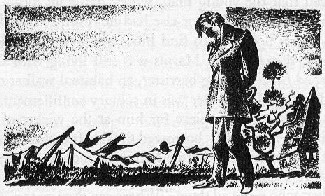Just a Lark
 I’m re-reading Victor Hugo’s Les Misérables after 20 years. Start with part 1, go back to read about the revolutionary mood of 1832 Paris, or read on!
I’m re-reading Victor Hugo’s Les Misérables after 20 years. Start with part 1, go back to read about the revolutionary mood of 1832 Paris, or read on!
Marius is utterly despondent after witnessing the attempted robbery. Cosette’s gone again, and he still doesn’t know her name – in fact, it’s worse, because he thought he knew it, but it turns out he doesn’t after all. He had to choose between his true love’s father and the man who saved his own father, and learn that the latter was vile and repulsive. Even now he can’t bring himself to testify against Thénardier, and actually sends him money in prison (even though he has to borrow it from Courfeyrac). He’s also stopped working and fallen into a vicious circle.
I love this scanning error in the Kindle edition: “It is her own thoughts that are reaching meh!”
Marius fails at telepathy.
At one point he wanders into a picturesque field that “because the place is worth seeing no one visits it.” But it’s called the Field of the Lark, and since he’s learned Cosette’s old nickname, he seizes on it as a sign. So from then on, whenever he gives up staring at the blank piece of paper he’s supposed to be writing on, he goes there.
Aftermath of a Robbery
You’d think Javert would be pleased at having captured most of the gang, but he’s troubled by one loss: “The prospective victim who escapes is even more suspect than the prospective murderer.” He’s already forgotten Marius except as “that little nincompoop of a lawyer who had probably been scared out of his wits.”
Montparnasse and Éponine apparently have…something going on. He escaped capture because he left early, “more in a mood to amuse himself with the daughter than play hired assassin for the father.” In a later chapter, he’s described as “perhaps [Thénardier’s] unofficial son-in-law.” It’s not clear how far it goes, though he’s more interested than she is. In any case, it’s odd that Hugo dances around this, considering how frank he is about, for instance, Fantine’s relationship with Tholomyès.
Remember how I joked that Claquesous was a vampire? He escapes on the way to prison, mystifying the police escort. “He had simply vanished like a puff of smoke, handcuffed though he was.” Yeah, vampire. Or maybe Batman. (Javert wonders if he’s a double agent, though of course he disapproves of the practice.)
Of course, they don’t let a “trifle” like being in prison keep them from running their criminal enterprise. They send messages back and forth between prison yards and out of the prison hidden inside lumps of bread, tossed over the wall. One of them gets wind of a likely house to rob in the Rue Plumet (sound familiar?), contacts Magnon (M. Gillenormand’s former servant from 200 pages ago!), who sends Éponine to check it out. Éponine takes one look at it, and sends back a coded message about a biscuit, meaning it’s not worth the effort. But she knows someone else very interested in the inhabitants of that house.
Lost and Found
It takes Éponine a while to track Marius down. First she locates his old friend Père Mabeuf, the gardener and book-lover who knew his father. He’s fallen on hard times, and gotten old besides. The girl helps the old man draw water from the well, an interesting reversal of Valjean and Cosette’s first meeting.
He calls her an angel. “‘I’m no angel,’ she replied. ‘I’m the devil, but it’s all the same to me.’” Her self-image needs some help.
After he answers her question about Marius, he turns around and she’s gone. Later that night as he’s drifting off to sleep, he wonders if she was a goblin. Or maybe she’s Batman. She’s certainly got the voice.
Though since she finds Marius at the Rivière des Gobelins, maybe Mabeuf was right.
Since Marius has last seen Éponine, she’s been worked over by both poverty and puberty. It’s a bit awkward, and it’s kind of surprising that Marius even notices. She starts rambling about this that and the other thing, while he answers her occasional questions with monosyllables.
She mentions that Mabeuf called him a baron. “You can’t be a baron. Barons are old. They go and sit in the Luxembourg, on the sunny side of the château, and read the Quotidienne at a sou a copy.” I guess this trope is older than I thought.
When she finally tells him “I’ve got the address,” he’s suddenly ecstatic. And Éponine? “She withdrew her hand and said in a tone of sadness that would have wrung the heart of any beholder, but of which Marius in his flurry was quite unconscious: ‘Oh, how excited you are!’”
Next: Catching up at the Rue Plumet…
My commentaries seem to be covering smaller and smaller chunks of text. I don’t know how much is the story getting denser, how much is the greater presence of interesting characters, how much has to do with it being so much easier to highlight a passage and come back to it later instead of commenting as I read, and how much is just seeing more connections because I’ve read more of the story so far.
Pages covered: 739-755. Image by Lynd Ward from an unidentified edition of Les Misérables, via the Pont-au-Change illustration gallery.